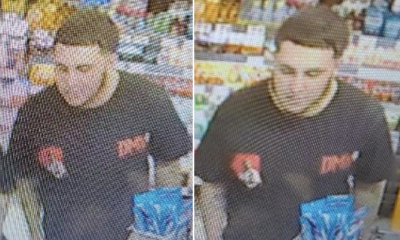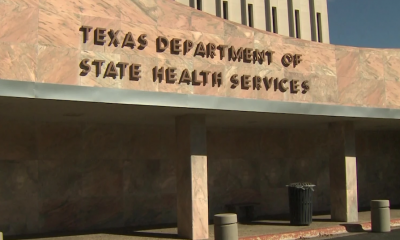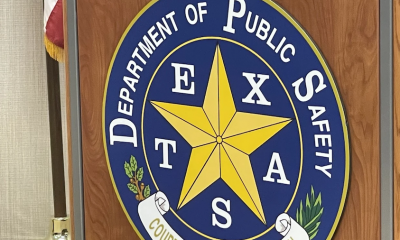COVID-19
Doctors Said COVID-19 Was Going to Kill Him. His Family Pushed Him Toward a Miracle.

PLANO, TX – Curtis Harden was on the phone with his longtime friend when medical staff entered his hospital room. It was time to hook him up to a ventilator. COVID-19 had made its way home. It was early January. Almost a year had gone by, and Harden and his loved ones watched as this new virus ravaged its way through the United States. But it was the ventilator that scared him.
He hadn’t heard of too many people making it off the machine once they were connected to it. Just weeks before, a family friend who had COVID-19 died within two weeks of going on the vent. Harden assumed the worst.
On the phone was Cheryl Zapata, a friend of three decades and a business partner. Medical staff at the Plano hospital had Zapata tell Harden he was going on the ventilator. It was better to have a loved one do it instead of a stranger, doctors told Zapata.
Harden started listing his last wishes.
As she listened, Zapata started to cry.
“I can’t have you cry,” Harden told her. “I need you to be strong.”
He was sure he was about to die.
“I’ve got to get off the phone and call my kids,” Harden said.
So fast
At 70, Harden was still in good health. Just before deer season, Harden drove fence posts at his lease with his middle son, Michael Harden. Curtis took this pandemic seriously. He wore a mask.
His family saw in his eyes that COVID-19 was about to change his life — all of their lives. The first sign that something was wrong was when one Curtis’ eyes turned bloodshot. Michael joked with his dad that he better not expose him to pinkeye. Curtis had what felt like a regular cold. This was around Jan. 3.
A couple days later, Curtis visited his primary care doctor and got a COVID-19 test. Zapata received a call from him.
“You won’t believe it,” he told her. “I have COVID.”
By then, more than 40,000 people in Collin County had been diagnosed with COVID-19 since the start of the pandemic last year, according to state data. The death toll in the county was approaching 500 killed.
A farm boy from West Texas, Curtis grew into a man who put others first.
“You really need to take care of yourself,” Zapata pleaded.
Curtis went into isolation. His son Michael talked with him every day, and they talked about everything from politics, history to philosophy. Curtis continued to get worse. His body ached, and his blood oxygen level fell.
On Jan. 13, Curtis checked into a Plano hospital.
Advocates
By now, hundreds of thousands of families across the United States have had to leave their loved ones in hospital rooms, where more than 41,000 have died alone in the U.S. since the pandemic began. With a virus so contagious, health authorities will not allow family members to visit.
His family recorded messages from relatives and friends, mixed them with some of his favorite songs, and asked the nursing staff to play the recording in his room.
“We asked the hospital to play the messages and the music all the time, and they did,” Zapata says.
Families and friends, she points out, must be advocates for their loves ones going through a fight with COVID-19. She took notes on what the doctors and nurses were telling her. Even when she didn’t know what a certain medical acronym meant, she wrote it down, researched it later, and came back with a better understanding.
“Write everything down and keep track of it,” she says, “so you can looking for yourself and see how the numbers are changing, or what they’re saying is changing. It helps to ask the right questions, because I had a history of what was happening.”
She stayed on the nursing staff, not that she did not trust them but because it was important to put into laymen’s terms for Curtis and other family members what was happening.
And the nurses encouraged her to do so.
“Even if you wake up at 2:20 in the morning, and you can’t stand it, and you want to know how he’s doing, you go ahead and call,” she recalls one nurse telling her.
The call
On Jan. 20, just a week after entering the hospital, Curtis’ loved ones received the worst news of their lives during one of the many phone calls between the hospital staff and the family. Curtis’ body was giving up. His kidneys had started to fail. His lungs had collapsed multiple times.
“I need a nurse for this call,” a doctor said on the line.
Zapata, sitting in her office, began to shake and cry. Some of her coworkers ran into her office.
“When he said that, I knew what was happening,” she says. “I just lost it.”
Only a miracle was going to save Curtis now, the doctor told the family. It was time to make him comfortable for his final turn toward death.
“I never cried that hard in my life,” Michael says. “I had no idea what that felt like until that day.”
Zapata leaned hard into prayer. She asked for that miracle. Even Michael, who had not prayed for anything in many years, began to pray again, asking his God to strengthen his family and for his dad, his best friend, to pull through.
“He is not going to die,” Zapata says.
And so far, she’s right.
More aggressive
The doctors, with a deteriorating patient in front of them, suggested palliative care options with the family, Zapata and Michael say. But in the face of a death sentence, Curtis’ family chose to be brave.
“If they’re telling us he’s going to die anyways, why not push them to be a little more aggressive?” Michael says.
The doctors went over a list of options with them, some of which could have killed him.
Staff put Curtis on dialysis, among other treatments. Within days, his toxicity numbers began to slowly fall. X-rays of his lungs showed less and less COVID. His kidneys began to produce more urine. Slowly, he returned to life.
“It wasn’t every day that we had good news,” Michael says. “A lot of days, he was stable, or maybe a step back. That incremental improvement kind of kept us all going.”
As Curtis become more aware of what was going on, a new frontier opened for his family: how to keep him positive, to reduce his anxiety? They reminded him to slow down, to take his recovery in stride. After numerous failed breath tests, Curtis finally passed.
On Feb. 6, medical staff removed him from dialysis. He came off the ventilator, that sign of certain death, on Feb. 7. And just last Wednesday, an ambulance carried Curtis out of the hospital to a long-term care facility in Plano where a long recovery remains before him.
Curtis still has blood clots in his lungs, his son says. He will need rounds of physical, occupational and speech therapy. Doctors are optimistic that he won’t need further dialysis treatment, and in the coming week, staff will begin to remove Curtis’ trake.
Staff at the new facility placed a star in the window of Curtis’ first-floor room, so the family would know where he is located. On Thursday evening, the family visited the window, to wave at Curtis and encourage him to continue his fight.
Zapata and Michael are just looking forward to giving Curtis a round of hugs.
“Then he’s gonna have to rest,” Zapata says, “which he is not gonna like.”










